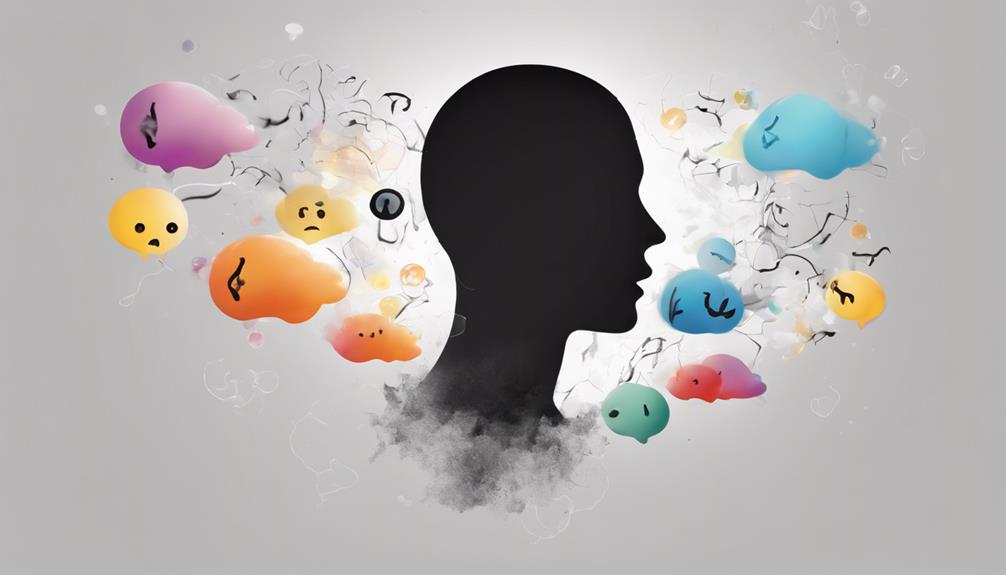Yield to curiosity: does silently cursing in your mind cross a moral line, or is it a harmless rebellion of thoughts?

Is It a Sin to Cuss in Your Head?
Opening Pandora's box, you might wonder if letting a curse word fly in the privacy of your own mind crosses the line into sinful territory. It's a fine line you walk, balancing thoughts that come unbidden and the beliefs that guide your moral compass.
With various religious and psychological perspectives weighing in on the matter, the debate between intention versus action becomes even more nuanced.
As you navigate the murky waters of moral self-reflection, consider what it truly means to sin in thought alone. The answer might not be as black and white as you think, inviting you to explore further into the realms of understanding sin and thought.
Key Takeaways
- The morality of cursing in thought hinges on intent and effort to control impulses.
- Different religions offer varied perspectives, with most discouraging cursing as contrary to principles of purity and right speech.
- Swearing internally can serve as an emotional release, complicating its moral assessment.
- Ethical introspection and understanding the origins of such thoughts are crucial for navigating their moral implications.
Understanding Sin and Thought

Throughout history, scholars and theologians have debated whether thoughts, including those of cursing, constitute sin, highlighting the complex relationship between intention, action, and ethical judgment. You're thrust into this discourse, exploring the intricate dynamics of mind purity and cognitive control.
The crux of this analysis pivots on the understanding that the human mind is a battleground of competing thoughts and impulses. It's in this context that the concept of sin transcends mere physical actions to encompass the realm of thoughts and intentions.
The pursuit of mind purity isn't just about suppressing negative thoughts or refraining from cursing internally; it's about cultivating a landscape of thoughts that aligns with one's ethical and moral compass. Cognitive control plays a crucial role in this endeavor, offering you the tools to navigate this complex terrain. It's a testament to the power of human agency in moderating thoughts and intentions in accordance with personal beliefs and societal norms.
In this scholarly exploration, you're invited to consider the nuanced perspectives on whether cursing in one's head breaches the threshold of sin. This inquiry isn't just about theological implications; it's a profound journey towards understanding the depths of human conscience and the capacity for self-regulation.
The Psychology of Swearing
Exploring the intricate dynamics of mind purity and cognitive control naturally leads us to examine the psychology of swearing, a field that sheds light on why we're drawn to use certain words in moments of strong emotion or stress. Swear word origins are deeply rooted in societal taboos and often reflect what a culture deems sacred or profane. This historical context enriches our understanding of the emotional weight these words carry, contributing to their potent release when vocalized or thought.
You'll find that swearing can serve as an emotional release valve. Studies suggest that the act of swearing, even internally, can have cathartic effects, helping to manage pain or release pent-up frustration. This doesn't mean that every instance of swearing is beneficial, but it highlights how our brains can use these words as tools for emotional regulation. The emotional release benefits are significant, indicating that swearing isn't merely a lapse in language or decorum but a complex psychological phenomenon with deep-seated origins and tangible effects on our well-being.
Understanding this helps us navigate the fine line between expressive language and maintaining mental purity.
Religious Perspectives on Cursing

Delving into religious perspectives, it's clear that attitudes toward cursing vary significantly among different faiths, each embedding these views within its broader moral and ethical frameworks. These distinctions often reflect cultural differences and are influenced by language evolution over time. To understand this better, consider the following table that highlights the stance of various religions on cursing:
Religion |
Perspective on Cursing |
|---|---|
Christianity |
Generally viewed as sinful, especially if it harms others or blasphemes. |
Islam |
Strongly discouraged, with a focus on purity of speech as a reflection of one's faith. |
Buddhism |
Discouraged, as it contradicts principles of right speech and non-harm. |
Hinduism |
Not explicitly mentioned, but harmful speech is contrary to the path of righteousness. |
From this analysis, you're invited to appreciate how deeply intertwined language and faith can be. Each religion frames cursing within the larger context of ethical speech and action, underscoring the importance of words in shaping moral character. This exploration not only illuminates the dynamic interplay between cultural norms and religious teachings but also highlights how language evolution challenges and reshapes these age-old tenets.
Intention Vs. Action Debate
When considering the morality of cursing, especially in one's thoughts, the distinction between intention and action becomes a crucial point of debate. The ethical implications of what we think versus what we do can be profound, yet understanding the boundary between them isn't always straightforward. Conscious control plays a significant role in this discourse, questioning how much command we've over our thoughts and whether they should be judged as harshly as our actions.
Consider these points:
- Thoughts often occur involuntarily, suggesting a lesser degree of control and, possibly, moral responsibility.
- Conscious control allows individuals to decide whether to act on their thoughts, introducing a clear ethical boundary between thinking and doing.
- The intent behind a thought can significantly influence its moral standing, but distinguishing between fleeting thoughts and deliberate contemplation can be challenging.
- The ethical implications of cursing in one's head may depend on the effort made to resist or indulge in those thoughts, highlighting the importance of conscious control in moral evaluation.
Understanding the nuanced relationship between intention and action invites a deeper reflection on how we assess the morality of our thoughts, urging a thoughtful and respectful approach to this complex debate.
Navigating Moral Self-Reflection

Having considered the complex relationship between intention and action in the morality of cursing, it's crucial you now turn your attention to the role of moral self-reflection in evaluating these thoughts. Ethical introspection and conscience examination serve as foundational pillars in navigating the murky waters of internal cursing. You are encouraged to delve deep into your own motivations and the context of these thoughts, which can often reveal more about your moral compass than the thoughts themselves.
Aspect of Reflection |
Purpose |
|---|---|
Ethical Introspection |
To critically assess the alignment of your thoughts with your personal values and beliefs. |
Conscience Examination |
To understand the emotional and moral implications of your thoughts, and how they affect your sense of right and wrong. |
Through this analytical process, you gain insight into the nature of your internal dialogue and its impact on your moral wellbeing. It's not merely about identifying if cursing in your head is a sin, but rather understanding why these thoughts emerge and how they reflect on your character. This journey of self-reflection is not just an exercise in moral judgment but a pathway to deeper self-understanding and ethical growth.
Frequently Asked Questions
How Does the Frequency of Cussing in One's Thoughts Correlate With Stress Levels or Mental Health Conditions?
You'll find that frequent cussing in thoughts might reflect stress levels or mental health issues, showcasing language evolution and cussing creativity. It's crucial to analyze how these patterns influence overall well-being respectfully and thoughtfully.
Are There Any Cultural Differences in How Internal Cursing Is Perceived in Terms of Sinfulness or Morality?
Different cultures perceive internal cursing through lenses of linguistic relativity and taboo evolution, impacting their views on morality. You'll find that societal norms and language shape what's considered sinful or morally acceptable in thought.
Can the Habit of Cursing in One's Head Impact Their Social Relationships or Communication Skills Over Time?
Cursing in your head might affect your social relationships and communication skills. Practicing mindfulness techniques and finding verbal expression alternatives can help you manage this habit, potentially improving how you interact and connect with others.
Is There a Neurological Basis for Why Some People Are More Prone to Curse in Their Thoughts Than Others?
Yes, there's a neurological basis. Your brain's plasticity and language evolution contribute to this tendency. This means you're more adaptable and your language processing is influenced by how your brain develops and changes over time.
How Do Non-Religious Ethical Frameworks, Such as Secular Humanism, Address the Concept of Cursing in One's Thoughts?
In non-religious ethical frameworks like secular humanism, cursing in thoughts is viewed through lenses of moral relativism and ethical autonomy. You're considered morally autonomous, with your ethical choices shaped by personal and societal values, not sin.
Conclusion
In analyzing sin, psychology, and religious teachings, it's clear that cursing in your mind isn't cut and dry. Your intention and awareness matter significantly. While religions caution against harmful thoughts, understanding and managing such impulses are key.
Reflecting on why you're tempted to cuss internally can guide you toward more mindful, positive thinking. Ultimately, navigating this moral landscape requires balancing self-awareness with compassion for your human imperfections, striving for growth rather than guilt.



Sign up